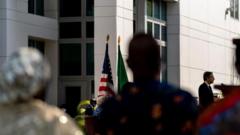In a historic shift for Nigerian politics, prominent figures Atiku Abubakar and Peter Obi have joined forces under the banner of the African Democratic Congress (ADC) to contest the 2027 elections.
Nigerian Heavyweights Unite for Political Change in ADC

Nigerian Heavyweights Unite for Political Change in ADC
A major political alliance forms as Nigeria's leading opposition figures join a new party.
In a landmark move for Nigeria’s political landscape, two of the nation’s most influential opposition leaders, Atiku Abubakar and Peter Obi, have officially aligned themselves with the African Democratic Congress (ADC), breaking away from their former parties, the Peoples Democratic Party (PDP) and the Labour Party (LP). This strategic coalition aims to challenge the current president, Bola Tinubu, from the ruling All Progressives Congress (APC), with both leaders hoping to avoid a repeat of the divided vote that characterized the previous elections.
The announcement marks one of the most significant political developments since Nigeria's return to democracy in 1999. During a recent press conference to unveil the ADC, interim chairman David Mark emphasized the coalition's objective to safeguard democracy and prevent Nigeria from succumbing to a one-party system.
Analysts believe that Abubakar and Obi, having narrowly lost the 2023 election—Abubakar garnered 29% of the votes while Obi captured 25%—have recognized the necessity of unifying their votes to enhance their electoral prospects. Shehu Iliyasu, an expert in Nigerian politics, suggested that the leaders learned from their previous experience and understand that collaboration could potentially lead to electoral success.
With Abubakar expected to once again seek the presidency at age 78, and Obi, 63, likely to serve as his running mate, the coalition is strengthening its ranks. Other key political figures joining the ADC include David Mark, Nasir El-Rufai, and Rotimi Amaechi, adding further weight to the new party's ambitions.
While some analysts like Ben Kenneth believe the coalition stands a stronger chance against Tinubu in 2027, others such as Sani Hamisu argue that incumbents like Tinubu typically have the advantage in seeking a second term. The APC’s acting chairman, Ali Bukar Dalori, dismissed the coalition as a non-threat, asserting that talks of unification are largely limited to Abuja.
Meanwhile, both the PDP and LP remain steadfast in their refusal to join the coalition, committing to face the APC in the upcoming elections independently.
This unprecedented alliance leaves observers questioning the future trajectory of Nigerian politics and whether this coalition will successfully challenge the ruling party in a country that has witnessed numerous political transitions.



















